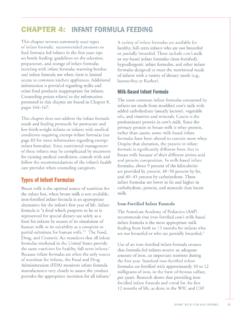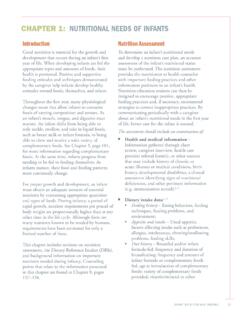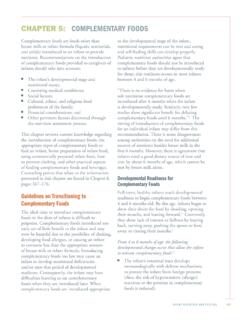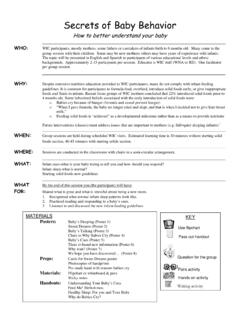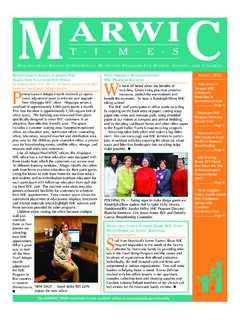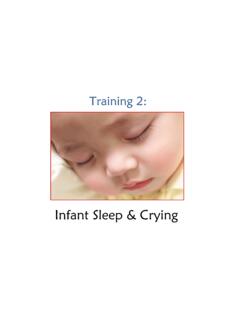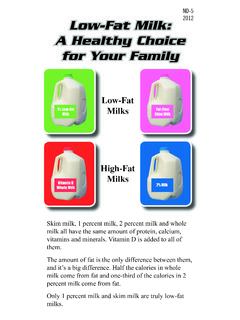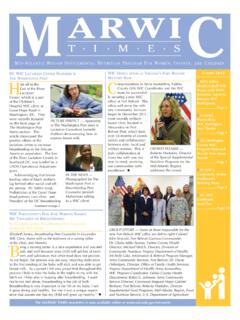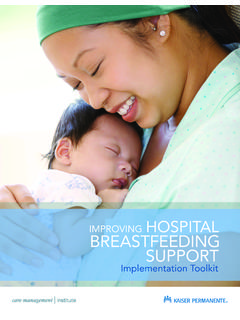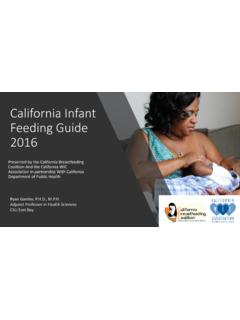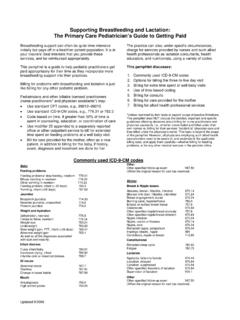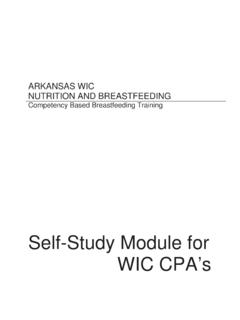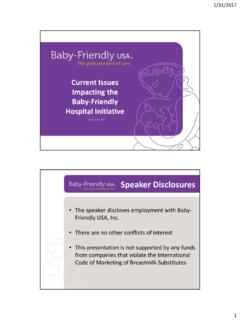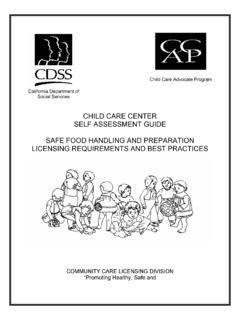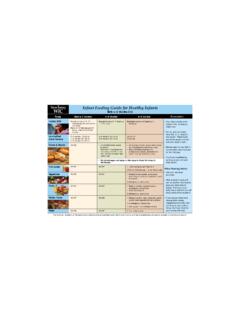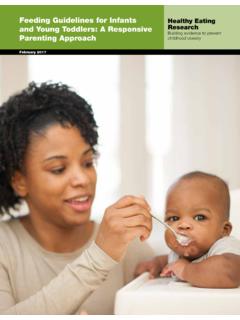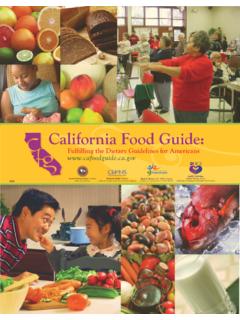Transcription of Birth - 4 month old baby 4 - 6 month old baby
1 Birth - 4 month old baby Breastfeed whenever your baby desires, or every 2 3 hours. If formula feeding , provide iron fortified infant formula. Your child s health care provider can help you determine how much infant formula to feed your baby . Never feed sweetened beverages, cow s milk, juice, cereal, sweetened gelatin or other foods to your baby in a bottle. Sweetened beverages include: water sweetened with sugar or honey, soda, sweetened iced tea, fruit drinks, punches, or ades, or other sweetened drinks. 4 - 6 month old baby Continue providing breast milk whenever your baby desires, or 5 feedings per day.
2 If formula feeding , continue to provide iron fortified infant formula. Your child s health care provider can help you determine how much infant formula to feed your baby . At this age, your child s health care provider is able to tell you if your baby is developmentally ready to try infant foods. It is important to only introduce one new, single ingredient food to your baby every 5 days. Be sure to watch your baby for signs of a reaction, such as rash, wheezing, or diarrhea after feeding a new food. If your child s health care provider recommends introducing solid foods, small amounts of infant foods, (1 2 Tb of each food per day), is all your baby needs.
3 Introduce iron fortified infant cereals, plain strained or pureed cooked vegetables, fruits, and protein rich foods such as meats, egg yolk, and legumes. Your child s health care provider may recommend feeding your baby a small amount of sterile water (4 to 8 ounces per day) in a cup when foods rich in protein are introduced. Check with your child s health care provider concerning your baby s water needs. 6 - 8 month old baby Continue providing breast milk whenever your baby desires, or 3 5 feedings per day. If formula feeding , continue to provide iron fortified infant formula.
4 Your child s health care provider can help you determine how much infant formula to feed your baby . At this age, most infants are developmentally ready to try infant foods. It is important to only introduce one new, single ingredient food to your baby every 5 days. Be sure to watch your baby for signs of a reaction, such as rash, wheezing, or diarrhea after feeding a new food. Introduce iron fortified infant cereals (4 6 Tb per day), plain strained or pureed cooked vegetables (3 4 Tb per day), fruits (3 4 Tb per day), and protein rich foods such as meats, egg yolk, and legumes (1 2 Tb per day).
5 Your child s health care provider may recommend feeding your baby a small amount of sterile water (4 to 8 ounces per day) in a cup when foods rich in protein are introduced. Check with your child s health care provider concerning your baby s water needs. 8 - 12 month old baby Continue providing breast milk whenever your baby desires, approximately 3 4 feedings per day. If formula feeding , continue to provide iron fortified infant formula. Your child s health care provider can help you determine how much infant formula to feed your baby . Provide your baby with iron fortified infant cereals or hot cereals (4 6 Tb per day), plain pureed, mashed or chopped cooked vegetables (3 4 Tb per day) and fruits (3 4 Tb per day), and pureed or chopped lean meat, poultry, fish, egg yolk, cheese, yogurt, or mashed legumes (1 3 Tb per day).
6 Your child s health care provider may recommend feeding your baby a small amount of sterile water (4 to 8 ounces per day) in a cup when foods rich in protein are introduced. Check with your child s health care provider concerning your baby s water needs. feeding Your baby in the First Year Breast milk is the best food for your baby ! Breast milk provides the right mix of nutrients your baby needs to grow and develop. If you are away from your baby , you can provide your baby with expressed breast milk. This ensures your baby receives the best nutrition possible. When breast milk is not available, iron fortified infant formula is an appropriate alternative for your infant s first year of life.
7 Here are a few tips on what to feed your baby during the first year of life. Nacimiento - 4 meses: Alimente a su beb siempre que lo requiera o cada 2 o 3 horas. Si lo alimenta con f rmula, que sea f rmula para beb s fortificada con hierro. El m dico de su beb puede ayudarlo a determinar la cantidad de f rmula para beb s que su hijo necesita. Nunca alimente a su beb con bebidas endulzadas, leche de vaca, jugo, gelatina endulzada u otros alimentos en una mamadera. Entre las bebidas endulzadas se incluyen: agua endulzada con az car o miel, gaseosas, t helado endulzado, bebidas frutales, ponches u otras bebidas endulzadas.
8 4-6 meses: Contin e alimentando a su beb con leche materna siempre que lo requiera o 5 veces por d a. Si lo alimenta con f rmula, contin e aliment ndolo con f rmula para beb s fortificada con hierro. El m dico de su beb puede ayudarlo a determinar la cantidad de f rmula para beb s que su hijo necesite. A esta edad, el m dico puede decirle si su beb est lo suficientemente desarrollado para probar alimentos para beb s. Es importante que su beb incorpore solo un alimento nuevo cada 5 d as. Aseg rese de observar a su beb para detectar signos de una reacci n como sarpullido, respiraci n dificultosa o diarrea luego de haber incorporado un alimento nuevo.
9 Si el m dico de su hijo recomienda incorporar alimentos s lidos, todo lo que su beb necesita son peque as cantidades de alimento para beb s (12 cucharadas de comida por d a). Incorpore cereales para beb s fortificados con hierro, pur s de vegetales cocidos, frutas y alimentos ricos en prote nas como carne, yema de huevo y legumbres. El m dico de su beb puede recomendarle que cuando alimente a su beb con alimentos ricos en prote nas, le suministre una peque a cantidad de agua esterilizada (de 100 a 250 cent metros c bicos por d a). Consulte con el m dico de su beb la cantidad de agua que su hijo necesita.
10 6-8 meses: Contin e alimentando a su beb con leche materna siempre que lo requiera o de 3 a 5 veces por d a. Si lo alimenta con f rmula, contin e aliment ndolo con f rmula para beb s fortificada con hierro. El m dico de su beb puede ayudarlo a determinar la cantidad de f rmula para beb s que su hijo necesite. A esta edad, la mayor a de los beb s est n lo suficientemente desarrollados para probar alimento para beb s. Es importante que su beb incorpore solo un alimento nuevo cada 5 d as. Aseg rese de observar a su beb para detectar signos de una reacci n como sarpullido, respiraci n dificultosa o diarrea luego de haber incorporado un alimento nuevo.
